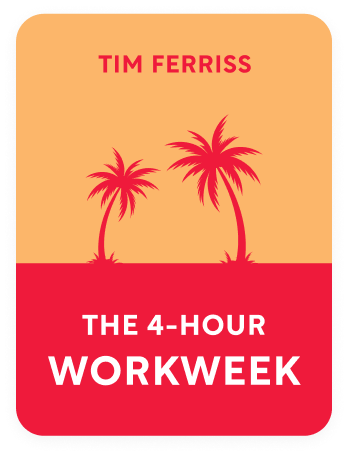

This article is an excerpt from the Shortform book guide to "The 4-Hour Workweek" by Tim Ferriss. Shortform has the world's best summaries and analyses of books you should be reading.
Like this article? Sign up for a free trial here .
Do you want to know how to enjoy retirement? What about a mini retirement or extended time off?
Tim Ferriss’s book is about not waiting for retirement to enjoy your time. But he also offers many useful tips for anyone who suddenly has a lot of time to fill, including retirees, and can offer advice on how to enjoy retirement.
Keep reading to find out how to enjoy retirement or a mini retirement.
How to Enjoy Retirement: Making the Most of Your Time
Congratulations! You’ve now significantly decreased your working hours or retired and earned yourself lots of free time. To get started on living the 4HWW lifestyle or learning how to enjoy retirement, the author recommends you try:
- Doing nothing. Take a total break from being efficient, rushed, and productive. You might try a silence retreat.
- Donating anonymously to an organization. This helps you separate getting credit for your actions from the act of doing them.
- Using your mini-retirement to learn and volunteer. The longer the better so you can focus on learning the local language.
- Reviewing and tweaking your dreamlines after each mini-retirement. Come up with new dreamlines as you discover new interests.
- Considering a vocation. A vocation can be full or part-time, just like work, but unlike work, it’s something that you really want to be doing.
Initially, you won’t have trouble living the 4HWW lifestyle or figuring our how to enjoy retirement. You’ll be doing all the things you’ve always want to that you’d been putting off. After a while, however, you’ll have more time than you know what to do with. You might feel bored or unhappy. This is normal. The author went through this period too—he had to make a to-do list that included things like “eat breakfast” so he would feel productive.
When you have free time, you also have more free mental time, and your brain starts trying to tackle existential questions. The author recommends the following for figuring out how to enjoy retirement:
- Mentally disengage from work culture. Remind yourself that part of the reason you feel like you’re being lazy or undeserving is that you’ve been socially conditioned to believe that deferred retirement and the rat race are what you should be doing with your life. These are old ideas. What you’re doing is better.
- Find a passion or vocation. When you’re focusing on something, it takes all your attention, so your mind doesn’t have the budget for life-choice doubts. Most people do this by doing one or both of the following:
- Learning. While mini-retiring, the author recommends learning the local language and one physical skill. You should learn a language because you can’t understand a culture until you understand a language, and because learning a language helps you connect with your own thoughts. You should learn a physical skill because sports are good for making friends and for forcing you to practice your language skills. You’ll learn faster while traveling than you would at home because the conditions are so different.
- Serving others or the planet. For the author, service is simply doing something that makes the world better. Philanthropy is more specifically making human life better, which you can do if you want, but keep in mind humans have created a lot of environmental problems. All that to say, you don’t know what overall effect your actions will have, so pick something you care about and do the best you can.
- For example, when considering how to serve, ask yourself what makes you angriest about the world, what makes you scared for future generations, and what makes you happy and how can you help others get it?
- Don’t stress about vague existential questions. If your brain asks you the meaning or point of life, don’t feel the need to answer. These questions are so vague and undefined no one could answer them, except by defining the word “life” from a dictionary. If you’re going to wonder about big questions, make sure that every word in the question has a clear meaning, and that once you’ve found an answer, you can do something about it. If a question doesn’t meet these two criteria, forget about it. This isn’t being irreverent or shallow, it’s about being smart.
- For example, whenever you have a negative thought, ask yourself why three times and write down the answers. Writing them will both help you get them out of your head and force you to put them into words, which decreases any ballooning effect of ambiguity.
- Make new friends. You probably regularly socialized with the people you worked with, even if it was only to send them cat videos. Make friends other than your coworkers.
Reducing Deliberation
Making decisions is exhausting because it takes time, energy, and attention. Note that it’s not the number of decisions we make that’s exhausting, it’s the number of resources we use deliberating. For example, when you’re buying something, the more options you have are directly correlated with the amount of buyer’s regret you’ll have, and with how happy you’ll be with your choice.
There are six ways to reduce deliberation to figure out how to enjoy retirement:
1. Automate decisions by making rules. Treat yourself the same way you treat your coworkers and outsourcers—make rules regarding certain actions and follow them in every case so you don’t have to think.
- For example, immediately delete any email that has the subject “chain letter.”
2. Don’t look for problems you can’t immediately solve. If you’re not in a position to do something about a problem (for example, it’s Friday night and everyone has left work for the week), avoid learning about it. If you find out about it, it’ll bounce around in your brain until you can fix it, distracting you from relaxing.
3. Don’t procrastinate decisions. If you already know your decision but are procrastinating giving it because it might make someone uncomfortable, stop. Give it now.
- For example, if you don’t want to go for dinner with someone, say you’re pretty sure you’re otherwise occupied but if that changes, you’ll let them know.
4. Make non-critical decisions quickly. If a decision isn’t about something important, give yourself a time limit, option limit, or if it costs less than a certain amount, get someone else to choose such as your VA.
5. Continue routines unless deviating is fun. Only look for variation when it will increase your enjoyment, otherwise, stick with routine.
- For example, the author eats the same breakfast and lunch every day, but he chooses something different every day for dinner.
6. Stop complaining. You complain because you regret decisions you made in the past. Notice every time you complain to avoid engaging in negative emotions.

———End of Preview———
Like what you just read? Read the rest of the world's best book summary and analysis of Tim Ferriss's "The 4-Hour Workweek" at Shortform .
Here's what you'll find in our full The 4-Hour Workweek summary :
- The 4-step process to live a "retired" lifestyle now
- Find out if you're wasting the best years of your life working a 9-5
- How to create a business that makes you money without sucking up your time






